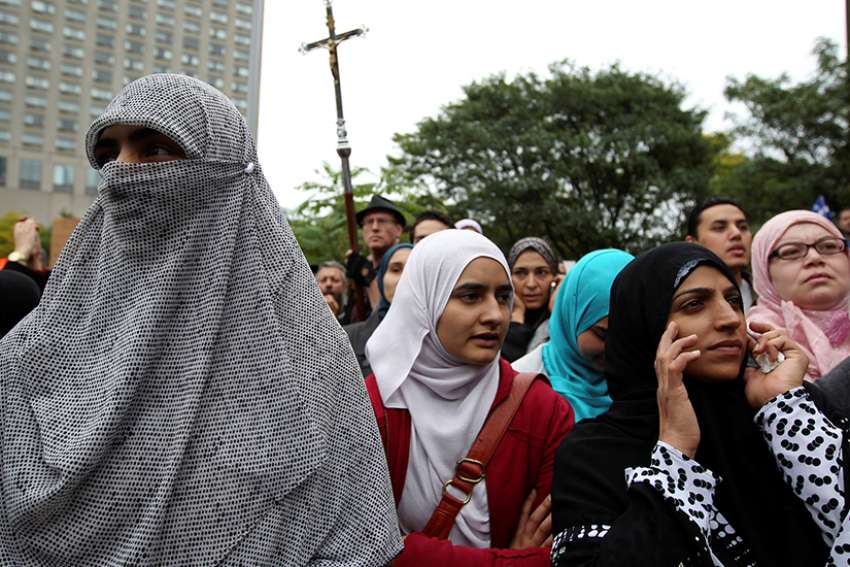Women in Montreal protest a proposed city Charter of Values in this 2013 file photo.
CNS photo/Christinne Muschi, Reuters
Canadian government urged to address all hatred
By Deborah Gyapong, Canadian Catholic News
OTTAWA – If the government is going to confront anti-Muslim hatred it should also address hatred against other religious groups and minorities, said Canada’s former Ambassador of Religious Freedom.
Appearing at the Heritage Committee hearings into the government’s Motion 103 on Islamophobia, Andrew Bennett said Canadian society needs to address anti-Muslim hatred that comes from “ignorance, indifference and fear,” but it must also address “hatred of Jews, Catholic, LGBTQ persons, people who oppose same-sex marriage, First Nations people, pro-lifers, and the list goes on.”
Bennett and other witnesses urged the government to protect Charter freedoms and to demonstrate a respect for pluralism.
“The Government of Canada’s role is to uphold the Constitution and to guarantee the freedoms we bear as citizens,” Bennett said. “These freedoms are not the gift of government. They are borne by us as citizens by virtue of our humanity.”
The former ambassador, now head of Cardus Law, urged the government to embrace pluralism and defend freedoms rather than encroach on them.
“This is a society that must be founded upon respect for difference, even when beliefs are so different that they are seen to run counter to the prevailing narrative of the day — whatever that might be,” Bennett said. “The government should be careful to not be too prescriptive of freedoms.”
Genuine pluralism means leaving room for deep disagreement, he said. “A common civic life without debate and encounter between us is no civic life at all.”
Combating racism and religious discrimination requires a “cultural shift” at all levels “from Parliament on down, and from local communities on up” so that people can “live their religious faith and beliefs publicly, including in professions, in our universities and our schools, our cultural institutions, and in our legislatures and public services,” Bennett said.
Larry Worthen, executive director of the Christian Medical and Dental Society of Canada, told the committee his organization’s 1,600 physicians and dentists “cannot turn off or on our faith in God.”
“Faith is so much a part of who we are that it must, by its very nature, spill over into all aspects of our lives. Because of this commitment, we are very empathetic to the concerns of all religious groups when we hear about prejudice, discrimination, or lack of tolerance in Canadian society.”
Worthen asked the committee to imagine a scenario in which a group with a characteristic protected by the human rights codes and the charter “was unable to practice their profession in certain provinces, or be educated in certain professional schools, because they had a particular protected characteristic.”
“Imagine policies put forward by their regulatory bodies designating that people who shared their moral convictions on a topic were seen to be unprofessional, selfish and not worthy of the noble position that their profession provided,” Worthen said.
“This scenario is not fictional,” Worthen told the committee. “It is real. It affects doctors, nurses and other health care professionals in parts of Canada who cannot, because of their religious beliefs, be involved in the intentional killing of patients at any stage of life.”
Some witnesses challenged the use of the word Islamophobia.
Dr. Sherif Emil, a paediatric surgeon at the Montreal Children’s Hospital, told of his growing up a Christian in Saudi Arabia where he routinely experienced religious persecution. He warned of the varying definitions of Islamophobia around the world that prevent criticism of Islam and used examples of people who have been imprisoned for running afoul of laws prohibiting it.
“In fact, many of the practices of Islamic State — public beheadings, murder of homosexuals, stoning for adultery — are also the practices of the government of Saudi Arabia,” Emil said. “The only difference is that the Saudi government codifies them into law, and brands anyone who dares to criticize them, as the Swedish foreign minister recently did, as exercising Islamophobia.”
Emil also challenged the idea of systemic racism and discrimination in Canada.
“I have lived in societies where systemic racism and discrimination exist. Trust me. I know what it’s like, and this is not it,” he said.
Please support The Catholic Register
Unlike many media companies, The Catholic Register has never charged readers for access to the news and information on our website. We want to keep our award-winning journalism as widely available as possible. But we need your help.
For more than 125 years, The Register has been a trusted source of faith-based journalism. By making even a small donation you help ensure our future as an important voice in the Catholic Church. If you support the mission of Catholic journalism, please donate today. Thank you.
DONATE

